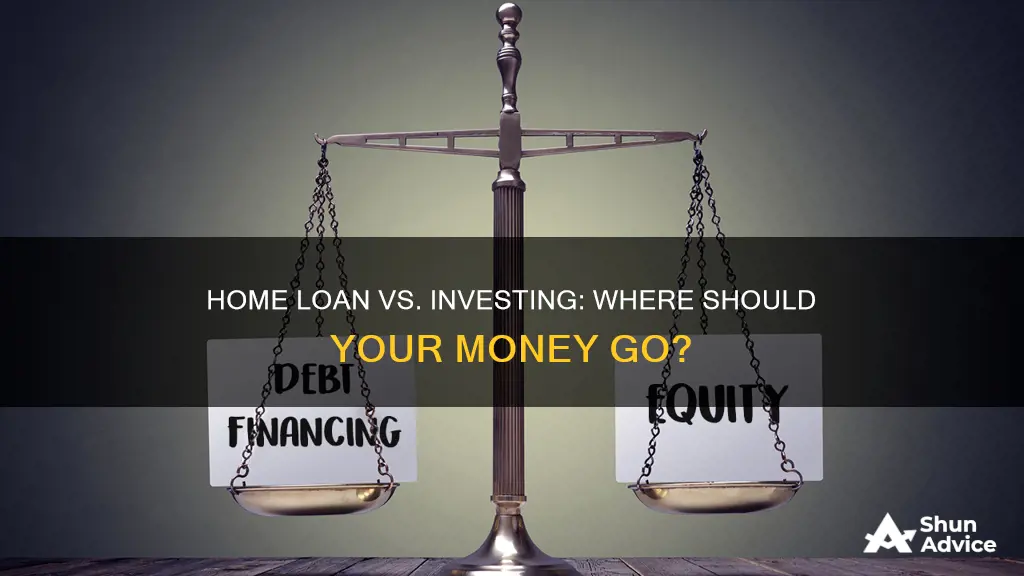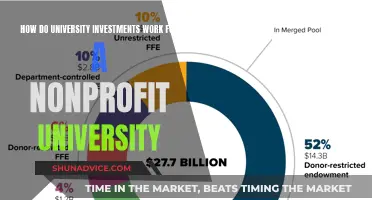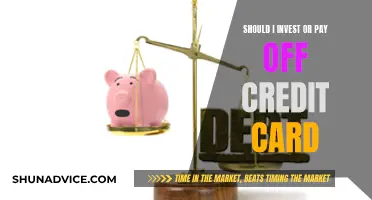
Whether to pay off a home loan or invest depends on a variety of factors, including your financial situation, risk tolerance, and long-term goals. Paying off a mortgage early can save you thousands of dollars in interest and provide peace of mind, but it may also mean missing out on higher returns from investing. On the other hand, investing offers the potential for higher returns but carries more risk and may not provide the same level of financial security as paying off debt. Ultimately, the decision comes down to your individual circumstances and priorities.
| Characteristics | Values |
|---|---|
| Risk tolerance | If you have a low tolerance for risk, paying off your mortgage may be the better option. |
| Retirement planning | If you are nearing retirement, paying off your mortgage may be the better option. |
| Interest rate | If you have a high-interest rate on your mortgage, paying it off may be the better option. |
| Financial situation | If you have received a large sum of money, such as an inheritance, investing may be the better option. |
| Tax deductions | Paying off your mortgage early may result in losing potential tax deductions on mortgage interest payments. |
| Peace of mind | Paying off your mortgage early can provide peace of mind by reducing your debt and eliminating monthly payments. |
| Opportunity cost | Investing your money may provide higher returns than paying off your mortgage early, but it also carries a higher risk of loss. |
| Liquidity | Investing in stocks, bonds, or similar vehicles provides better liquidity than paying off your mortgage early, as it is easier to access your money if needed. |
What You'll Learn
- Paying off a home loan early can save you thousands of dollars in the long run
- Investing your money can generate higher returns than the interest cost of a loan
- Paying off a home loan early can give you peace of mind and make you debt-free
- Investing is riskier than paying off a loan, but it can increase your future wealth
- Paying off a home loan early may result in losing tax benefits

Paying off a home loan early can save you thousands of dollars in the long run
Paying off your home loan early can save you thousands of dollars in interest. However, before you start putting a lot of money towards your home loan, there are a few factors you should consider to determine whether it's a smart option for you.
Every time you make a mortgage payment, it is split between the principal and interest. During the first few years of your loan, most of your payment goes towards interest. You owe less in interest as you pay down your principal, which is the amount of money you originally borrowed.
You can make extra payments directly to the principal balance of your mortgage. Making additional principal payments reduces the amount of money you'll pay interest on before it can accrue. This can knock years off your mortgage term and save you thousands of dollars.
For example, let's say you borrow $150,000 to buy a home at 6% interest with a 30-year term. By the time you pay off your loan, you'll have paid a total of $173,757.28 in interest in addition to the $150,000 you initially borrowed. Now, let's say that you pay an extra $100 every month towards a loan with the exact same term, principal and interest rate. At the end of the term, you'll have paid a total of $128,170.57 in interest. That's $45,586.71 less than you would have paid without the extra payments. You'll also pay off your loan 81 months earlier.
Pros:
- Save money on interest: By reducing the length of time you spend making mortgage payments, you'll cut down the amount of interest you pay over the life of the loan.
- Free up money for later in life: By paying off your mortgage early, you'll free up cash to spend on other things when you're older, such as travel.
- Increase home equity: Paying off your loan will increase the amount of equity in your home, which you could tap into with a home equity loan, home equity line of credit (HELOC) or cash-out refinance.
- Peace of mind: If you don't like the idea of constant debt, paying your mortgage early could ease your burden.
Cons:
- Less money for higher-interest debt: If you have credit card or student loan debt, putting your extra cash towards paying off your mortgage early can cost you in the long run as these types of debt likely have higher interest rates.
- Less money for savings: Putting all of your money towards your mortgage can also cut into what you can set aside in savings.
- Could miss out on higher returns from investing: If you have the opportunity to invest your money for returns that are significantly higher than your current mortgage rate, you'd be better off doing that than getting rid of your mortgage faster.
- Loss of some tax breaks: You may lose out on tax deductions for mortgage interest if you normally itemize.
Key considerations
- Prepayment penalties: Based on the terms of your loan, you could be subject to a prepayment penalty for paying off your mortgage early. Typically, loans older than three years are not subject to this type of penalty.
- Emergency fund: Make sure you have enough liquid assets to cover your needs, including any unexpected expenses.
- Investment opportunities: Consider whether investing your money could earn you a higher return than the interest you're paying on your mortgage.
- Risk tolerance: Assess your tolerance for risk and how conservative you want to be with your investment choices.
- Interest rates: If your mortgage rate is lower than the inflation rate or lower than the returns you could reasonably expect to earn by investing your extra cash, paying your home off ahead of schedule may not save you money.
Final thoughts
Whether you decide to pay off your home loan early or invest your money depends on your individual circumstances and financial goals. Consult a financial planner and tax advisor to help you analyze your personal situation and goals.
Euro: A Smart Investment Move?
You may want to see also

Investing your money can generate higher returns than the interest cost of a loan
While paying off your mortgage early can save you thousands of dollars in interest in the long run and is often a solid financial decision, investing your money instead may generate higher returns than the loan's interest cost.
For example, let's say you have a 30-year mortgage of $200,000 with a fixed interest rate of 4.5%. Your monthly payments would be $1,013 (not including taxes and insurance), and you'd spend a total of $164,813 in interest over the life of the loan. Now, assume you're able to come up with an extra $300 per month to put toward your mortgage. You'd save $67,816 in interest and pay off your mortgage 11 years early.
On the other hand, you could take that $300 per month and invest it in an index fund that tracks the S&P 500. Historically, the S&P 500 has returned an average of 10% to 11% annually since its inception in 1926 through 2018. If you assume an average annual return of 8% on your investment, you'd have $160,780 at the end of 19 years (about the time it would take to pay off your mortgage early). That's more than double your potential interest savings, and you'd still have about $55,293 left on your mortgage.
Another example: assume you bought a house for $250,000 and took out a 30-year mortgage loan of $200,000 with a fixed interest rate of 3.25%. Your monthly mortgage payment would be $870 (not including taxes and insurance), and you'd pay $113,350 in interest over 30 years. However, if you received a raise and could make additional monthly payments of $2,000, you'd pay off your mortgage in 6 and a half years and pay only $21,900 in interest, resulting in total interest savings of $91,400.
Now, let's see how the returns compare if you invest that $2,000 each month instead of paying extra on your mortgage. Assuming an 8% annual rate of return, you'd earn $203,700 over 6 and a half years, which is about $112,300 more than the interest you'd save by prepaying your mortgage.
These examples illustrate how investing your money can generate higher returns than the interest cost of a loan. However, it's important to note that investing carries more risk than paying off a mortgage early. While paying off a mortgage early provides guaranteed savings, investing in the stock market or other investments may result in losses, and there is no guarantee of a favourable return. Therefore, it's crucial to carefully consider your financial situation, risk tolerance, and long-term goals before deciding whether to invest or pay off your mortgage early.
GME: The People's Investment
You may want to see also

Paying off a home loan early can give you peace of mind and make you debt-free
If you pay off your mortgage early, you will save thousands of dollars in interest payments. You will also be free of debt, which can be liberating. Depending on the size of your monthly payments, that's $1,000 or more a month that you can now use elsewhere. You can also leverage your equity to open a home equity line of credit (HELOC) or do a cash-out refinance to make renovations to your home.
Another benefit of paying off your mortgage early is that you will free up funds for other purposes, such as investing in your future or personal hobbies. Additionally, paying off your mortgage can help you build equity in your home, which can be useful if you want to refinance or take out a home equity loan.
However, there are also some potential downsides to paying off your mortgage early. One is that you may cut into your savings. It can be risky to put all of your money into an investment that is not easily accessible in an emergency. Another potential downside is that paying off your mortgage early may be your only investment, neglecting other important investments such as your retirement fund. Additionally, you may lose out on tax deductions for mortgage interest if you pay off your mortgage early. Finally, depending on your lender, you may incur a penalty for paying off your mortgage too quickly.
Stratton Oakmont: Victims and Vanishers
You may want to see also

Investing is riskier than paying off a loan, but it can increase your future wealth
Investing is a riskier option than paying off a loan but it can also increase your future wealth. The stock market has historically generated higher returns than mortgage rates, and investments can earn compound interest. This means that, over time, you could earn exponentially more on your investments than you would save by paying off your mortgage early.
However, investing in the stock market is inherently risky. You could gain or lose thousands of dollars. Returns on investments are not guaranteed, and there is a chance you could lose money. By contrast, paying off your mortgage early is a sure thing – you know exactly how much money you will save in interest.
If you are a homeowner, it is important to consider your risk tolerance and financial situation. If you are nearing the end of your mortgage payments, it may be more beneficial to focus on investing. However, if you are still in the early years of your mortgage and paying mostly interest, it may be better to pay off your mortgage early. This will save you money in the long run and is often a solid financial decision.
If you are still unsure about what to do, it is always a good idea to consult a financial advisor who can help you make a plan that takes into account your individual circumstances and financial goals.
Who Invests in the Stock Market?
You may want to see also

Paying off a home loan early may result in losing tax benefits
Paying off a home loan early can result in losing tax benefits. This is because mortgage interest is tax-deductible. For example, if a homeowner's first-year interest expense totals $14,857, at a personal tax rate of 24%, this implies tax savings of $3,566 in just the first year of the mortgage. In effect, the government is incentivizing homeowners to take on debt. Paying off a mortgage early reduces the interest expense and the corresponding tax shield.
The new tax law, the Tax Cuts and Jobs Act (TCJA), introduced a $10,000 limitation on the deductibility of state and local taxes (SALT). Interest on up to only $750,000 of new mortgage debt is deductible, while the prior law allowed an interest deduction on $1,000,000 of mortgage debt. The interest deduction for home equity loans has also been eliminated unless the proceeds of the equity loan are used to "buy, build, or substantially improve" the home. These changes mean that many homeowners will no longer be able to itemize their deductions and will instead have to take the standard deduction, which has been increased under the TCJA. As a result, they will lose the tax benefit of a mortgage, as interest on the loan won't be able to be written off.
The decision to pay off a home loan early or invest depends on several factors, including the borrower's financial circumstances, the loan's interest rate, and how close the borrower is to retirement. It's important to consider the opportunity cost of paying off a home loan early, as any extra money used to pay down the mortgage cannot be used for other opportunities, such as investing in the stock market or other financial goals.
Bonds: A Safe Haven for Investors
You may want to see also
Frequently asked questions
Paying off your mortgage early can save you thousands of dollars in the long run. You'll save on interest, be debt-free, and free up funds for other investments. You can also leverage your equity to open a home equity line of credit (HELOC) or do a cash-out refinance.
Paying off your mortgage early might cut into your savings and could be your only investment. You will also lose out on tax deductions for mortgage interest. Depending on your lender, you may incur a penalty for paying off your mortgage too early.
Investing in the stock market gives you the potential to earn a higher rate of return than paying off your mortgage early. You will also increase your future wealth and have better asset liquidity. If you're investing in a retirement account, you may benefit from an employer match.
Investing is riskier than paying off your mortgage, and you may lose money. You will still need to make payments on your investments, and they won't necessarily make your debt go away.
The decision to pay off your mortgage or invest depends on your financial situation, risk tolerance, and long-term goals. If you have other high-interest debt, such as credit card debt, it may be more beneficial to pay that off first. Additionally, consider building an emergency fund to cover unexpected expenses. Consulting a financial advisor can help you make the best decision for your situation.







